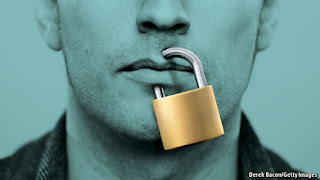Is it Better to Suppress Misinformation or Publicly Critique it?
The best way to foster a
conspiracy theory is for the authorities to try to suppress it. This has long
been well known. Take UFOs. Even the Pentagon seems to have grown tired of the
whole thing. In April they
released videos, taken by naval aviators, of unidentified flying objects in
order to “clear up misconceptions”. There’s nothing like turning the light on
to dispel fears or suspicions about whatever it was that went bump in the
night.
But in the 21st
century social media platforms have meant that a bizarre range of conspiracy
theories and misinformation take on a life of their own. Should they be allowed
to fester and spread? It doesn’t seem practical to address them all publicly,
and whose responsibility would that be? A government body? The Ministry of
Misinformation? Please no. And, let’s face it, not all theories and
misinformation could be addressed adequately, because they spawn too fast, so would
there need to be a criterion, or level of significance, for when it is in the
public interest to do so?
If so, then surely this has
been reached with the 5G network. I first encountered this particular
conspiracy theory when the manager of our tiny local movie theatre was loudly proclaiming
the dangers of 5G in the foyer, handing out leaflets, and encouraging people to
watch the film 5G Apocalypse. This is a YouTube film by Sacha Stone, an
American blogger. I went home and looked at the film, just to keep ahead of the
game, especially because it given that, as I soon discovered, 5G
cellphone towers were being sabotaged in the UK and the Netherlands.
Following the rousing
music and images of threatening technology, 5G Apocalypse introduces us
to Mark Steele, who calls himself a “weapons systems head of display expert”,
whatever that is. He tells us from the podium of a talk he is giving that “5G
is a killer”. Cut to hand-held camera and Mark out in the street, where he points
to a cellphone tower and says, “This 5G roll-out is a weapons system”.
Unfortunately, he has already told us, “Do not believe a single word I say.” He
wants us to carry out our own research, but telling people not to believe you
is a dangerous rhetorical device, because,
like me, they might do just that.
The conspiracy hysteria
then ramped up considerably with the corona virus pandemic, with claims
that it was caused by, linked to or exacerbated by the 5G network. So, you must
admit, this has gone way beyond the Loch Ness Monster and whether the moon
landing was faked. Whether people, en masse, believe this stuff really matters.
This was no doubt the
thinking of Eamonn Holmes, when talking on ITV’s This Morning programme.
He suggested that the theory linking 5G masts and corona virus deserved to be
discussed in the mainstream media, even tought he thought the theory was “not
true and incredibly stupid”. For this he was reprimanded by the broadcasting
watchdog, Ofcom, for undermining public confidence in the Government’s social
distancing rules. Ofcom stated that the view that the theory deserved a public
hearing was “ill-judged and risked undermining viewers’ trust in advice from
public authorities and scientific evidence” and could lead to “significant harm
to the public”.
The case was taken up by
Toby Young, of the Free Speech Union,
who wrote to Ofcom:
As I said in my letter, prohibiting public debate about the Government’s
advice during this crisis is likely to lead to a lack of confidence in that
advice, not the other way round. Put simply, if broadcasters aren’t allowed to
challenge those making a connection between 5G masts and the symptoms
associated with COVID-19 and present them with evidence to the contrary, people
are more likely to believe there’s a connection, not less.
Across the Atlantic, the free-speech social media platform Parler has refused
to censor the controversial coronavirus documentary Plandemic after Facebook, Twitter, and Google’s YouTube all banned the short movie from their platforms.
“Twitter, Facebook and the other Technofascists
believe they should decide for others. They label, ban and censor anything and
everything as harmful misinformation if it is inconsistent with the narrative
and the worldview they want to impose,” said
Parler CEO John Matze said in a statement.
As Matze indicates, these
debates are occurring in the context of social media platforms being widely criticised
for taking an increasing role in deciding what information the public should
and should not be exposed to, as I mentioned in a previous
blog, especially with regard to sites and commentators that have a
conservative bias. This has been highlighted in recent years by the very public
wrangles between PragerU and the tech giants.
PragerU describes
itself as setting out to combat the left-wing education received at university.
Its regular videos feature content by high-profile commentators like Dave Rubin
and Douglas Murray, and tackle contentious issues such as disputing the
scientific consensus on climate change. According to Wikipedia, “As of August 2019, PragerU videos have been
watched more than 2 billion times and are becoming a staple on college campuses”.
So, not surprisingly YouTube and Facebook have been trying to censor this
content, and PragerU has filed a number of lawsuits in reaction to various
videos being flagged, demonetised or put in “restricted mode”.
Donald Trump, who has
made life incredibly difficult for himself by personally taking on the world’s mainstream
media, has now had enough of the anti-conservative bias of the big social media
platforms. Breitbart notes,
“The Trump administration is considering setting
up a panel to review cases of anti-conservative bias from major tech companies,
according to a report in the Wall Street Journal.” That will be interesting, but of course there is probably
an election first.
It’s a funny
thing. When I was a teenager in the 1970s it was popular and left-wing to be
anti-censorship, and to fight for free speech. Lenny Bruce was a hero, everyone
had a Che Guevara poster on their wall, and Pink Floyd wanted to break down the
Wall. Those wanting to shut down free speech were associated with parents,
government and other conservative institutions. Now the roles have reversed. It
is the left who want to shut down discussion about climate change, about the
Pakistani grooming gangs, about failing green technologies, and want “hate
speech” to extend to whatever someone might be offended by – unless you’re right-wing,
of course. Then anything goes.
Harry Wiren




Comments
Post a Comment